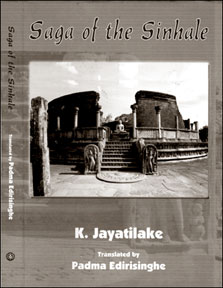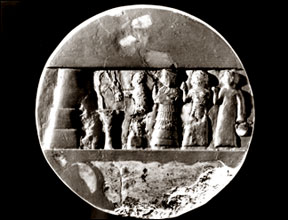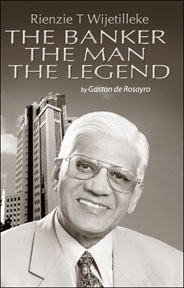
End of the Sinhala race?
Saga of the Sinhale
Author - K. Jayatileka
Translator: Padma Edirisinghe
Publishers: Godage & Bros.
 Padma Edirisinghe, who won the award for the best translation for the
year 2006 has come out with another translation this year too. Padma Edirisinghe, who won the award for the best translation for the
year 2006 has come out with another translation this year too.
This time the book subjected for translation is veteran writer K.
Jayatileka's "Sinhalayage Arambaya saha Avasanaya" (Beginning and end of
the Sinhala race).
Jayatileka too won the Sahityaratne Award this year. The translator
evidently has stamped a more positive aspect on to the title believing
as she does, that the Sinhala race should not end.
The book focuses on the spectacular episodes of Lanka's history and
gives the following conclusions:
* That all that is identified with the name Sinhala today is
teetering on the brink of doom.
* Hence one should probe into the issue whether the Sinhala race has
not contributed anything significant to world civilization so that this
race could continue its onward journey.
The translator with her own exotic English and professional attitude
has amply done justice to the original content that argues these facts.
Here is an extract from "the beginning" of "The Beginning", the title
of the first chapter. "Speculations on the original venue of the birth
of mankind have been rife and consequently many scientists believed that
a terrain in Central Asia earned this significant status.
Now these same scientists identify a more Southward location,
specifically Radolfe in the river valley area of Omo, near the Equator
in the African continent between Northern Kenya and South West Ethiopia.
Again they have changed their mind and are of the consensus that this
very important spot where mankind commenced its journey was not
sequestered in one particular area. The probable area fluctuates its
position among the land ranges of Africa, South America and the Pacific
regions including Australia.
Thus the discrepancies of opinions on the issue drag on with some
areas getting priority regarding the status under discussion."
Unlike in the award winning translation where the name of the
translator is not given on the cover of the book, "Saga of the Sinhale"
has on its cover the name of the author as well as the name of the
translator.
This raises the issue whether there is no stipulated code for the
position of translators, an issue that would certainly bloat in size
with the increasing number of translations in the country. Who decides
as to where the name of the translator should appear.
Is it the author (who wants all the glory for himself) or the
translator (who perhaps opts for modesty) or the publisher who can be
indiscriminate? Here is an interesting point for discussion.
Great writing is not male writing
Response:
In response to the issue raised last week in
Writer's Den titled "Great Writing is not male writing" we publish here
the response sent by the Winner of the State Literary Award for the
English novel, 2007, Daya Dissanayake. He believes women should not
label themselves as "women writers".
by Daya Dissanayake
 Vijita Fernando has written to the Sunday Observer of November 11th,
that 'Great writing is not male writing'. Here are a few thoughts about
'women writers' and "men writers'. Vijita Fernando has written to the Sunday Observer of November 11th,
that 'Great writing is not male writing'. Here are a few thoughts about
'women writers' and "men writers'.
Though males are always accused as chauvinists, do they ever write or
talk about "men writers"? It could be argued that men do not have to
talk about "men writers" because they are the dominant group and do not
feel any kind of inferiority. But in reality women have played a very
prominent role as writers, throughout the history of humankind.
The first writer on earth is accepted as Enheduanna, who lived over
4300 years ago. There could have been others before her, but such
writing has not been preserved or is not yet discovered. Enheduanna was
the daughter of Sargon of Akkad, and became the high priestess of the
Moon God Nanna.
She would never have considered herself a 'feminist' or identified
herself as a 'woman' writer, when she composed hymns to Goddess Innana.
Then we have Sappho, the Greek Poet 1700 years after Enheduanna.
Sappho composed her own music so her poems could be sung to the
accompaniment of a lyre. Plato wanted to consider her as the 10th Muse.
Closer home, during the Vedic period, over 3000 years ago, we hear of
Ghosha, who composed hymns in praise of Ashwins, Lopamadura wife of
Agasthya, Maitreyi wife of Yajnavalkya, and Gargi the daughter of sage
Vachaknu, all of them had made their own contributions of hymns
collected in the Vedas.
Sometime later, those who created Theri Gatha would not have
considered themselves 'Feminist' either. They would not have wished to
have a seperate gender identity. There is a school of thought that the
first Sri Lankan historical document, 'Dipavamsa' was writtten by one or
more bikkhunis. What is important to us is the contents of Dipavamsa and
not the gender of the author.
In our part of the world literature and all arts seek blessings from
Goddess Sarasvati, but there is no information that she has been partial
to women writers, perhaps because she does not recognize any gender
distinction.
Or may be her powers are counterbalanced by those of God Ganesha, who
is also considered the God of writers. We find the same gender issue in
other parts of the world. There was Baalat, in the city of Byblos, who
was associated with books and writing.
In ancient Egypt Seshat was the Goddess of writing, and she was also
the consort of Thoth who was considered the god of writing. In Chinese
mythology the god of writers and gamblers is one and the same. In
Armenian mythology there is no god to protect writers, unless Tir, who
was the god of wisdom could also be considered the patron of the writers
too.
When Prof. D. C. R. A. Goonetilleke won the Sahitya Ratne award in
2006, no one pointed out that he was a man. So what is so special about
Anne Ranasinghe been honoured with the Sahitya Ratne, unless she
received it as a woman writer, which was not mentioned anywhere. She was
honoured as a writer. The Award was made 'In recognition of her
distinction as a writer'.
If Vijita could mention Ransiri Menike, Padma and Janaki, then a
'male chouvinist' could point out that there were 33 men who won state
awards this year as against the 6 women!
Doris Lessing should have received the Nobel prize long ago. There is
no dispute about that even among men. But was she considered for the
Nobel for her 'Feminist' writing only? How could we say that Doris
Lessing was the author of the first publication containing 'Femnist
ideas', unless we mean the modern day "Feminist movement', which was
really a creation of the male dominated society to keep the woman 'in
her place'?
With regard to the Daily News short story competition, where 'all
three winners were women', could it be just a coincidence that not only
the two judges, but also the editor were all women? And in the selection
fourteen out of twenty four is as it should be, because there is a
slightly higher percentage of women in Sri Lanka than men.
'Feminism' today is really an anti-family movement and has no place
in our society or our culture, where woman is held in high esteem and
respect and even though sociologists label ours as a patriarchal
society, in reality it is the women who rule at home.
In such a case what are women fighting for, unless they themselves do
not know what they want? Or are they ashamed of their own sex or gender?
There never was a Lakshman Rekha. No one told Sita to stay within the
circle. She drew it around herself and then blamed the men for trying to
confine her inside!
Those who try to create a separate identity are often those who feel
they are in the minority, that they are underprivileged, unrecognized,
ignored, or mistreated.
There are also those who feel there is injustice done to them, those
who feel that the law does not treat them equally. Women writers in Sri
Lanka, or in the other parts of the world, do not appear to have any
such problems. That is what makes it difficult to understand why they
need this separate identity.
There are women who write mostly for women, then there are also men
who write mostly for men, that does not mean that all women's writings
are meant for women only or vice versa.
Creative writing by women in the western world would have needed a
separate identity in the past, because then women did not get an equal
opportunity to learn. But today even in the west the situation has
changed and perhaps literacy is higher among women today.
Could we consider Maha Prajapati Gothami as a feminist because she
fought for the rights of women to be ordained? In the end Buddha allowed
women to enter the Samgha, but today once again they are denied the
opportunity.
Where are the Maha Prajapathi Gothamis of today, or is it that the
Feminists of today are only interested in secular freedom?
Further views on this issue are most welcome.
Meteoric rise of an icon
Title: The Banker, the Man the Legend
Author: Gaston Rosayro
Published by: Vijitha Yapa Publications
by Bishop Vianney Fernando
 "Rienzie T. Wijetilleke: The Banker The Man The Legend", is the
life-story of a remarkable human being, a banker par excellence, a Sri
Lankan to the core and a true patriot. "Rienzie T. Wijetilleke: The Banker The Man The Legend", is the
life-story of a remarkable human being, a banker par excellence, a Sri
Lankan to the core and a true patriot.
Rienzie has risen to dizzy heights in his chosen occupation and has
currently reached the pinnacle of success in his banking career.
Rienzie's biographer, Gaston de Rosayro, the renowned journalist, with
his elegant use of language, backed by his long journalistic experience,
unfolds the story of this dignified man with several anecdotes, some
laced with humour, while giving the reader many incisive insights into
Rienzie's multi-faceted and intriguing personality.
His is a fascinating record of a success-story. And yet, as the
biographer well attests, the path of his subject's professional career
has not been strewn with roses. As in the case of certain rare intrepid
achievers he has had to face many odds and seemingly insurmountable
obstacles through the journey of life.
The biographer has been able to unravel with adroit plausibility for
the reader the secret of his success.
Rienzie has been always a man with a sense of mission based on a
clear vision. It has not merely been his talents, his administrative
acumen or his clear mind and determination that has made him what he is.
There are more attributes such as his inexplicable inner strength,
undoubtedly stemming from the values he lives by, deeply rooted in his
religious convictions and early upbringing, that has come to his rescue
in difficult times.
It is these values that have stood him in good stead in his meteoric
rise as a national icon. In fact we are privileged to observe an
authenticity of life that has endeared him to his peers and co-workers
and has won for him the love and respect of his numerous friends here
and abroad.
The author plausibly alludes to his subject's shining qualities of
mind and heart, honesty, integrity, deep attachment to his family, his
profound sensitivity to people, especially the marginalised, and the
underprivileged and his unfailing sense of loyalty to his institution
and peers.
That kind of consideration for the less fortunate is not only
fulfilling for a leader of his unique calibre but has given banking a
whole new sense of honourable investment.
This means that he has conceived the opening up of well-disposed bank
accounts into which he has made humanitarian deposits that pay even
richer dividends than mere hard cash remuneration.
The impact on the community and the nation by this dedicated
individual has been phenomenal. This then is the exhilarating story of a
legend, of one man who changed the corporate culture of the bank he
administers armed with his own vision and moral resources.
Towards this end he has demonstrated a seldom seen resolve and scale
of spirit that has been combined with an endearing personal charm and
straightforward authority.
The author dexterously weaves Rienzie's experiences in different
settings with vibrant metaphor illustrating portraits to eventually
fashion a canvas that surpasses the confines of biography. The detailed
scenes, the moods and feelings are all captured intensely as he
reconstructs the life and distinguished career of a unique personality
of our times.
The author also portrays many of the secondary individuals and those
on the periphery with careful precision. Many contrasting characters
that shared some of the same experiences but provided different
perspectives on the historic events in which they were dramatis personae
are cleverly brought into play.
There are also several interesting and touching incidents in which
the biographer draws out the psyche of the man.
The book also teaches us an object lesson in compassionate leadership
that brings a sense of balance and a fresh approach to doing business in
the marketplace.
It elucidates clearly that those who exhibit the characteristics of a
considerate leader will fare better in handling crises while being able
to communicate far more effectively in any economic and social climate.
Rienzie's biography is one that any reader will find both gripping
and inspiring. But for the young and not so young aspirant who seeks
distinction in the corporate sector, it is bound to provide ample
material for contemplation, motivation and guidance.
Gaston, the accomplished biographer, has sketched with consummate
skill each chapter as it unfolds the remarkable life, the struggles and
achievements of this extraordinary human being as fascinatingly as the
captivating episodes of an excitingly serialised tele-drama. |
